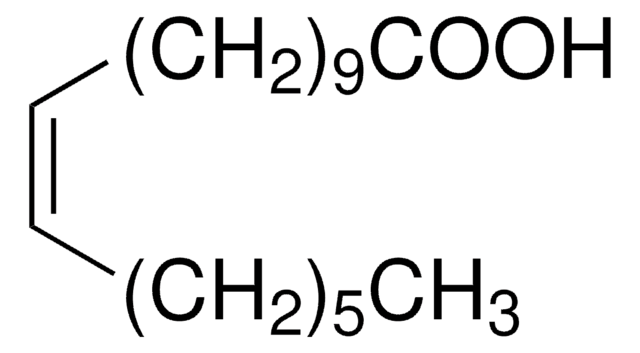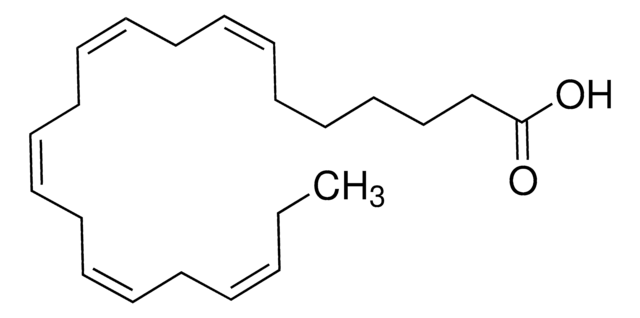This product is sold as an analytical standard, but that does not preclude it from use in other research applications such as the one mentioned. Product V0384, which is labeled For R&D Use, could also be used. Neither Product 69301 nor Product V0384 is used in an animal model as part of the quality control testing.
69301
cis-Vaccenic acid
analytical standard
Sinónimos:
octadec-11(cis)-enoic acid, cis-11-Octadecenoic acid
Seleccione un Tamaño
Seleccione un Tamaño
About This Item
Productos recomendados
grado
analytical standard
Ensayo
≥97.0% (HPLC)
Formulario
liquid
caducidad
limited shelf life, expiry date on the label
impurezas
≤0.5% trans-isomer
índice de refracción
n20/D 1.459 (lit.)
bp
150 °C/0.03 mmHg (lit.)
mp
14-15 °C (lit.)
densidad
0.887 g/mL at 25 °C (lit.)
aplicaciones
clinical testing
temp. de almacenamiento
−20°C
cadena SMILES
CCCCCC\C=C/CCCCCCCCCC(O)=O
InChI
1S/C18H34O2/c1-2-3-4-5-6-7-8-9-10-11-12-13-14-15-16-17-18(19)20/h7-8H,2-6,9-17H2,1H3,(H,19,20)/b8-7-
Clave InChI
UWHZIFQPPBDJPM-FPLPWBNLSA-N
¿Está buscando productos similares? Visita Guía de comparación de productos
Categorías relacionadas
Descripción general
Aplicación
- Quantification of the analyte and its photodegradation products in marine samples using gas chromatography coupled to electron impact mass spectrometry (GC-EIMS).[1] The photo-oxidation of the lipid components of the two strains of aerobic photoheterotrophic bacteria, Erythrobacter sp. strain NAP1 and Roseobacter-related isolate COL2P is studied and the results obtained after irradiation of axenic and nonaxenic cultures of the diatom, Skeletonema costatum is compared.[1]
- Quantification of the analyte in the methanolic extract of the leaves of Lepidium sativum using gas chromatography coupled to mass spectrometry (GC-MS).[2]
- Quantification of the analyte in methanolic extract of Rosmarinus oficinalis leaves using gas chromatography coupled to mass spectrometry and Fourier transform infrared spectroscopy.[3]
Productos recomendados
Código de clase de almacenamiento
10 - Combustible liquids
Clase de riesgo para el agua (WGK)
WGK 3
Punto de inflamabilidad (°F)
446.0 °F - closed cup
Punto de inflamabilidad (°C)
230 °C - closed cup
Elija entre una de las versiones más recientes:
¿Ya tiene este producto?
Encuentre la documentación para los productos que ha comprado recientemente en la Biblioteca de documentos.
-
Can this be used for experimental arthritis research in rodents
1 answer-
Helpful?
-
Active Filters
Nuestro equipo de científicos tiene experiencia en todas las áreas de investigación: Ciencias de la vida, Ciencia de los materiales, Síntesis química, Cromatografía, Analítica y muchas otras.
Póngase en contacto con el Servicio técnico







